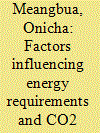| Srl | Item |
| 1 |
ID:
131226


|
|
|
| 2 |
ID:
126551


|
|
|
|
|
| Publication |
2013.
|
| Summary/Abstract |
Household consumption requires energy to be used at all stages of the economic process, thereby directly and indirectly leading to environmental impacts across the entire production chain. The levels, structure and determinants of energy requirements of household consumption therefore constitute an important avenue of research. Incorporating the full upstream requirements into the analysis helps to avoid simplistic conclusions which would actually only imply shifts between consumption categories without taking the economy wide effects into account. This paper presents the investigation of the direct and indirect primary energy requirements of Australian households, contrasting urban, suburban and rural consumption patterns as well as inter- and intra-regional levels of inequality in energy requirements. Furthermore the spatial and socio-economic drivers of energy consumption for different categories of energy requirements are identified and quantified. Conclusions regarding the relationships between energy requirements, household characteristics, urban form and urbanization processes are drawn and the respective policy implications are explored.
|
|
|
|
|
|
|
|
|
|
|
|
|
|
|
|
| 3 |
ID:
166494


|
|
|
|
|
| Summary/Abstract |
Addressing consumption-based CO2 emissions, often called CO2 requirements, of households is key for developing a low carbon society. In this study, we analyzed the factors influencing these consumption-based CO2 emissions of households in Thailand. Household survey data, economic input-output tables, and panel data regression analyses for the years 1995–2010 were used to investigate the effects of socio-economic and demographic factors on energy and CO2 requirements of households in Thailand. The empirical results showed that socio-economic and demographic factors influenced the changes in energy and CO2 requirements. Temperature is the most significant factor influencing energy and CO2 requirements (a 1 °C increase in temperature resulted in a 200% increase in energy and CO2 requirements). Education is a key driving factor which positively influenced direct energy and CO2 requirements but negatively influenced the indirect energy and CO2 requirements. Our results provide important information for decision makers on how socio-economic and demographic factors influence consumption-based CO2 emissions of households in Thailand. Since most household-related energy policies in Thailand are voluntary in nature, the awareness, education and behavioral aspects need to be thought through more carefully when designing efficient policies towards low energy and low carbon society.
|
|
|
|
|
|
|
|
|
|
|
|
|
|
|
|